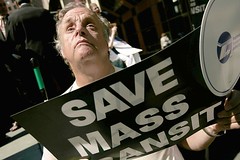Transit advocacy

Brian Johnson was among the hundreds who showed up for a downtown rally on Tuesday calling for more transit funding. (Tribune photo by Jose M. Osorio / August 28, 2007)
1. In Chicago, see "Politicians lead rally for transit funding," from the Chicago Tribune.
2. In Baltimore, "Scrapping of traffic-congestion plan urged: Proposal tilts too heavily toward highways, mass-transit advocates say," in the Baltimore Sun. From the article:
A coalition of mass-transit advocates urged the Baltimore Regional Transportation Board yesterday to scrap its $8.7 billion draft plan for traffic congestion relief over the next 28 years, contending that the proposal is heavily skewed in favor of highway projects.
The advocates are attacking a potential blueprint for what the region's transportation system would look like in 2035. They say the draft Transportation Outlook 2035, prepared by local governments and the transportation board's staff, directs too much money to road projects, including many that would encourage sprawl and violate the state's Smart Growth policies.
At a public hearing last night, speakers almost unanimously turned thumbs down on a plan that critics described as lacking in regional vision. Advocates demanded a roughly even split of the funds to finance a full regional rapid transit network and MARC system improvements.
The Greater Baltimore Committee expressed disappointment that the draft didn't include a Metro system extension to Morgan State University and Good Samaritan Hospital. Gregory Schaffer, president of Johns Hopkins Bayview Medical Center , asked why the East Baltimore campus, with more than 6,300 employees, had been left out of plans for a new transit line and a MARC system upgrade.
3. And finger pointing and blaming in Northern Virginia. See "As Dulles Rail Staggers, Players Share in Blame," subtitled "Delays, Cost Run-Ups and a Threatened Loss of Funds Combine to Cloud the Project's Future," from the Post.
Re the latter, how about using the tactics of Mayor Daley and others, and advocating-demonstrating vis-a-vis the FTA?
But really, as pointed out by many, and by Ed Risse, a columnist for the Virginia politics (and more) website Bacon's Rebellion wrote in 1999, in the piece "It is Time to Fundamentally Rethink METRO and Mobility in the National Capital Subregion," the Dulles subway expansion is ill-conceived because it's a very long ride, and not designed in terms of how it impacts the entire subway system and the opportunity to expand capacity through chokepoints rather than further contribute to constraints.
(Note that there is a goodly part of his argument I disagree with, but that makes sense. He is focusing on the impact of the subway system in the suburbs, while my primary focus is in the center city and its immediate borders, and to some extent Arlington.)

D.C. trains slowed by fire, outages. Chris Groubert, 24, checks the map in the Pentagon City Metro station Tuesday in Arlington, Va. The Washington-area Metro system has been plagued by fires and outages in the past few days, resulting in train delays. (AP photo by Jacquelyn Martin / August 28, 2007)
Labels: land use planning, transit, transit oriented development, transportation planning



0 Comments:
Post a Comment
<< Home